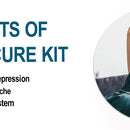Stress Cure Kit
Regular price
$105.11
Sale
According to the definition, stress is a feeling of emotional or physical tension. While it may start easily, when aggravated, it can lead to various mental health concerns. Usually, stress crops up because of situations that may make you frustrated, worried, or angry. Simply put, stress is our body’s reaction to difficult situations and challenges. While avoiding stressful situations is advisable, short bursts of stress can help us focus better and meet deadlines in mild crises.
Ayurvedic concept-
According to Ayurveda, the stress levels in our body are governed by three energies the doshas Vata, Pitta, and Kapha. The amount of positive and negative stress in an individual’s body largely depends on these three energy levels (doshas).
Ayurveda suggests that most individuals have bi-doshic constitution (Vata-Pitta, Pitta-Kapha, Vata-Kapha) in their bodies. These doshas can influence their overall mental well-being. Let’s look at these doshas and how they can influence our mental health:
- Vata dosha: This gives us quick thinking capabilities, unlocks our creativity and innovation, and can optimize our intuitive power. People with a dominant Vata dosha may come across life situations that can make them anxious. When dosha levels go up, one may have to deal with fear, anxiety, insomnia, isolation, etc.
- Pitta dosha: Pitta dosha helps us with determination, intelligence, competitiveness, and confidence. When these dosha levels go up, individuals may feel more angry, irritated, frustrated, or incompetent. In addition, sweating, heartburn, diarrhea, and hypertension can spike Pitta dosha levels.
- Kapha dosha: Kapha energy is associated with strength, steadiness, and reliability. People with a dominating Kapha may often resist change and be stubborn in usually uncomfortable situations. This may lead to high-stress levels. For people with a dominant Kapha dosha, stress may result from comfort eating, lack of motivation, tiredness, lethargy, etc.
Yoga for Stress
Regular practice of yoga can encourage mental and physical relaxation. This may help reduce stress and anxiety levels. Physical aspects of yoga can help increase flexibility, release physical stress from several points in the body, and ease down blockages such as muscle knots, eventually relieving tension.
You can practice the following yoga postures for relief from stress and anxiety:
- Virasana (Hero pose)
- Vrikshasana (Tree pose)
- Trikonasana (Triangle pose)
- Uttanasana (Standing forward bend)
- (Child’s pose)
- Uttana Shishosana (Extended puppy pose)
- Matsyasana (Fish pose)
- Paschimottanasana (Seated forward bend)
- Janu Sirsasana (Head to forward knee bend)
- Leg up the wall pose
- Baddha Konasana (Reclining bound angle pose)
Apart from these yoga postures, you can also try practising various series of yoga postures, such as Surya Namaskar (Sun Salutation).
Benefits



































































































